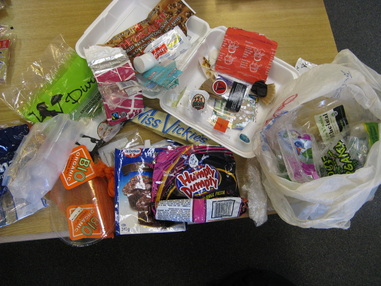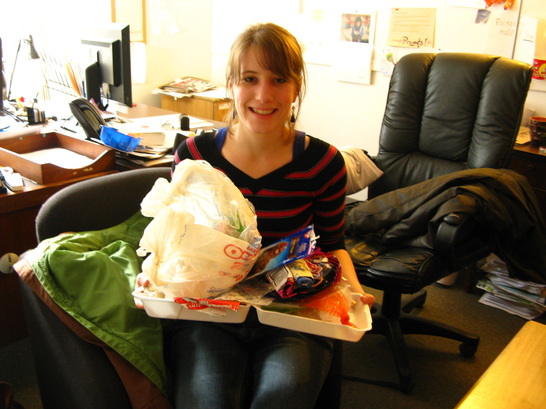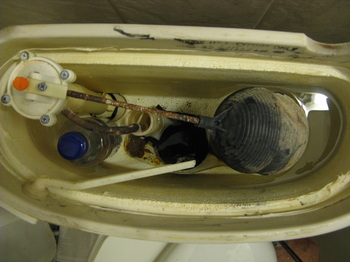 All of my garbage for the month of March For the month of March, I took the Zero Waste Challenge at Sustainable Concordia. Every single thing that I could not compost or recycle for the entire month, I kept in a little bag. Before it started, I vowed that I wouldn't have any garbage. But I realized on the first day that this would be way harder than I thought. I did end up with garbage, unfortunately, although definitely less than I would have made if I wasn't participating in the challenge. So, how much garbage did I end up creating for the entire month of March? A half a pound, baby! Some of it was just random bits of plastic, like the part you peel off of a new margarine container. Some of it was embarrassing, like an individual creamer from tea at a restaurant, or just how many bags of chips I caved and ate during the month. And some of it seemed inevitable, like when my toothpaste tube ran out on the third week. One sort of surprising thing that happened to me during the month is that I noticed garbage WAY more than I normally do. Walking down the street, I felt like I was aware of every single disposable coffee cup in someone's hand, every piece of litter around me. At a restaurant, I had to either eat ALL of my food, or tuck the rinds, teabags, or raw tomatoes (ew. I can try to eat them sometimes, but I'm not a fan.) into a napkin to compost later. At parties, I had to make sure that my beer caps were recycled, and that I didn't eat any candies or anything individually packaged. I was hyper-aware of everything everyone else ate, all the paper towels that ended up in the trash can instead of getting composted, all of the apple peels that get thrown out because composting really isn't available to most people, unless they do it at home.
Another, weirder thing happened to me. I became oddly attached to my trash. Keep in mind, I carried my bag of trash with me pretty much everywhere I went. At work, it was in my desk or in my backpack. At home, it was pinned up on the fridge. I kept some of the grosser trash (tofu packaging, sandwich wrappers) in the freezer so they didn't get rancid, but the rest of it came with me everywhere. But I felt like I knew really well what was in that bag at all times, and even now, almost a month later, I feel like I could make a list of everything in the bag. A coworker and I were discussing our trash, and we joked that we were going to to feel kind of sad to throw our trash away. I'm sure it sounds pretty weird, since most of the time we only keep trash for only a few seconds before throwing it in the garbage can. But bring it everywhere for a month, and suddenly it's not someone else's problem- it's yours. I'm going to watch a documentary called The Clean Bin Project on Tuesday at Green Drinks downtown. It looks pretty cool; it's about this couple who have a competition for one year of who can produce the least waste. It'll be playing on April 24th at 6pm in the Thomson House basement on the McGill campus.
2 Comments
In the environmental science class that I teach, one of the assignments is for the students to calculate their ecological footprint, write a response on it, and choose one action to change for the next two weeks. I always love reading these assignments! It's later in the semester, so students have learned more or less where their food and energy comes from, a little about global water issues, and are generally more aware about environmental issues than when they started. Some students are surprised, or horrified even, when they learn that if everyone lived the way they did, we would need four or six earths. Some aren't - they assumed that their lifestyle was pretty average, and by now we've learned in class that Americans generally produce more waste and use more oil per capita than most other countries. For their two week lifestyle change, some students usually choose to go vegetarian (some had always been curious what it would be like, or if they could even do it for so long). Some students decide to take shorter showers (from 30-45 minute showers down to 6 minute showers)...I don't even know how you can take a 45 minute shower. Sometimes students find these actions fairly easy, and feel that they can adopt it somewhat permanently into their life, but I'm sure that many students just take it as an experiment. Either way, this is the best way that I can come up with to challenge the students to try a change to reduce their impact. And for myself? I also do the assignment (but I don't have to do the writeup! The perk of being a teacher). My ecofootprint has very slowly decreased over the past two years, as I've found new ways to use less. For the past assignments, I've stopped using a clothes dryer at home (I installed a pretty sketchy looking clothesline in my room), asked my landlord to turn down the heat (this was not successful, but now we have our own thermostat so I can keep the apartment a chilly 18 all winter long. I have lots of fluffy socks), and joined a community supported agriculture (from Lufa, the amazing Montreal-based rooftop greenhouse). I have to say that joining a CSA probably made the biggest impact, since all winter long I've been eating more in season (I never want to eat another freaking beet or turnip again) and since it's all local and organic, I think I've cut down on my pesticides and transportation. This year, I decided to reduce my water consumption. I had a few goals for my two weeks: 1) put a full bottle in the toilet tank to reduce the amount of water used for flushing every time 2) FINALLY change the low- flow showerhead that I got for my birthday two years ago (I know, I ask for very exciting birthday presents) 3) fix all the damn leaky faucets in my apartment It was pretty easy to put a full water bottle in my toilet tank, once I figured out how to put it in there it without knocking into anything. Surprisingly, my toilet still works totally normally, and I'm sure you can't notice that there's less water used for flushing.  Same with the low-flow showerhead. It was hard to unscrew the old showerhead, so I had to convince my brother to come over with some tools to change it. I thought at first that it would be a little unpleasant to shower with less water, but I can't really tell the difference, and it saves tons of water. My last goal was to fix all my leaky faucets myself. I asked for help on this one too, but I could only turn the water off for one of the faucets. I did fix one leak, but I couldn't fix the others. Those will have to wait. In the meantime, I think I'm saving a lot of water with my low-flow showerhead and my home-made low-flush toilet. |
About ShonaI'm an eco-conscious girl from Montreal, Quebec. I'm currently an adjunct science professor at Champlain College of Vermont (Montreal Campus). I'm interested in any opportunities to expand my experience with grassroots activism, climate change legislation, or environmental education. Archives
March 2016
Categories
All
|



 RSS Feed
RSS Feed
